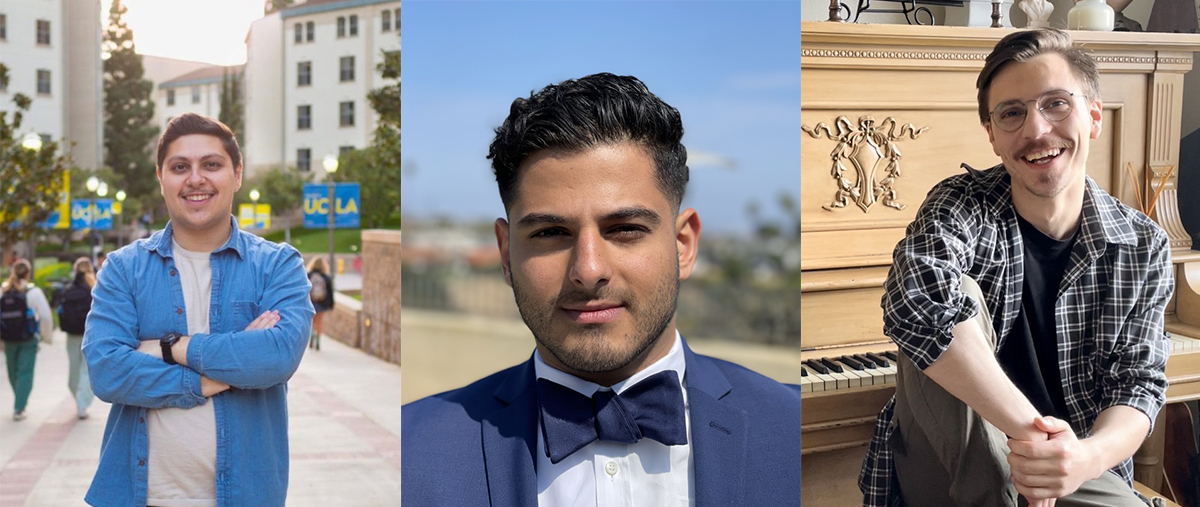The Quad: UCLA’s Arab American community discuss engaging with their identity and heritage

Nadir Fouani, Chris Kallah and Mahmoud Abobaker (left to right) reflect on how their Arab American identity has shaped their experiences in and out of college. (From left to right: Courtesy of Nadir Fouani, Courtesy of Chris Kallah and Courtesy of Fatminazahra Taghlaoui)
By Hiba Alnajjar
April 29, 2023 8:20 p.m.
As National Arab American Heritage Month comes to an end, Bruins discussed their relationship with their Arab American identity in terms of their experiences at UCLA and academic passions.
Since the first major wave of immigrants from the Arab world arrived in the late 19th century, Arab Americans have made contributions to a wide range of different industries including business, engineering, medicine, literature, politics, athletics and the arts, according to Arab America. National Arab American Heritage Month seeks to celebrate the strides being made by more than 3.5 million Arab Americans living in the United States today by highlighting their contributions to society.
Mahmoud Abobaker, a third-year film and television student, is Palestinian and grew up in Damascus, Syria. He lived in Europe before moving to the U.S. five years ago.
Abobaker said his experiences motivate him to pursue a more realistic mode of filmmaking to combat Arab stereotypes in the media.
“Just looking at the last 10 years, starting from the Arab Spring, you have content that you can make hundreds of films about realistically,” Abobaker said. “I believe I have a lot of content to deal with.”
Abobaker added that some of his past and upcoming projects cover topics such as identity, religiosity, immigration and coming-of-age.
“All I know is, I’m going to do what I believe in. Being known or being box office successful or being famous is not as prioritized to me as delivering an idea that I believe in,” Abobaker said.
For some Arab Americans, their identity may also be channeled into their work.
Christopher Kallah, a fourth-year psychology student and second-generation Arab American, said his engagement with his Arab American identity has progressed over time, especially through his increased involvement with clubs on campus.
“It’s always been a part of me, but it wasn’t until college where I started to understand more Arabic and be more involved with the Middle Eastern club and the Lebanese club on campus, but it’s definitely shaped me,” Kallah said. “The language I speak, how I present myself. There’s a lot of things that come with being Arab. … So I’d say it’s definitely shaped a major part of me, even without knowing.”
Kallah added that his Arab upbringing has shaped his approach to health care as an aspiring doctor.
“The way I grew up and the way a lot of Arabs grew up, we’re very social. … I’m very personable, and I think that kind of comes from my culture,” Kallah said. “I want to get to know the patient. I want to interact with the family, and I think that’s something that comes from my heritage.”
According to a study conducted by the American Psychological Association, Arab Americans often have a strong sense of community that serves to ease personal burdens in the face of challenges.
Nadir Fouani serves as the resident director for Hedrick Summit, one of UCLA’s residential buildings. Fouani’s parents both immigrated to the U.S. from Lebanon and settled down in Dearborn, Michigan, a city that has one of the highest percentages of Arab Americans in the U.S., according to CNN.
Similar to Kallah, Fouani said he came to learn more about his Arab American identity as he grew up.
“I think, growing up, I did not really understand what it (being Arab American) meant to me. But as I was getting older, and especially exploring outside of my city, I learned a lot about my heritage,” Fouani said.
Fouani added that it is important to feature Arab American voices when discussing ways to promote diversity in academic and professional contexts.
“I talk about the meaning behind my name, or maybe the experiences that my parents faced or my siblings have faced, and I have faced,” Fouani said. “I try to put that out into the world, especially when there’s conversations around diversity and even just inclusion.”

